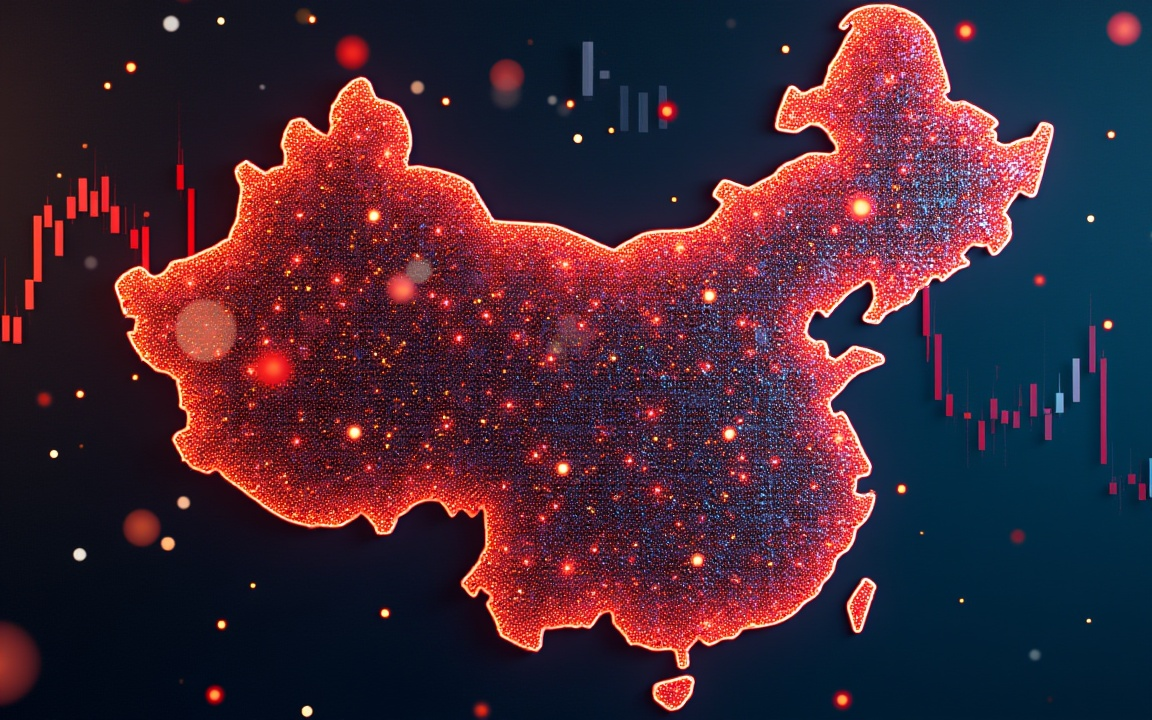China’s stock markets are staging a strong rally, with artificial intelligence emerging as the central force behind investor enthusiasm.
The sharp rise follows a muted 2024, when Chinese equities were in decline for most of the year.
In eight out of twelve months in 2024, the China A market fell, reflecting weak sentiment as Beijing attempted to kick-start economic growth.
But the landscape has shifted dramatically in 2025.
Investor enthusiasm was turbocharged in January, when Chinese start-up DeepSeek claimed to have developed an AI model that was significantly cheaper to build than those produced by better-funded American rivals.
The announcement energised the market and reinforced Beijing’s ambition to catch up with the United States in the AI race.
Indices climb on AI optimism
The rally has reshaped market benchmarks.
The MSCI China Index, which tracks the country’s largest companies, has risen for five consecutive months and is up more than 40% this year.
That compares with a gain of about 15% for a similar US index.
Technology stocks now dominate the Chinese benchmark, with Tencent, Alibaba, and Xiaomi accounting for about 30% of its weight.
In the US, Nvidia, Microsoft, and Apple together make up roughly 20% of the comparable index.
The mainland CSI 300 Index has climbed more than 21% since January, reaching three-year highs.
The CSI 300 Information Technology Index, which captures China’s listed tech firms, has hit its highest level since 2015.
Tech giants post extraordinary gains
Companies at the forefront of China’s AI push have seen their stock prices multiply.
Alibaba, which has built widely used open-source AI models, has gained more than 120% this year.
Source: The New York Times
Semiconductor Manufacturing International Corporation (SMIC), China’s most advanced chipmaker, has surged around 180%.
Other major technology players, including Baidu, Tencent, and Xiaomi, have rallied about 60% each.
By comparison, Nvidia, the US chipmaker central to the global AI boom, is up around 40% in the same period.
Beijing doubles down on AI
The Chinese government has placed AI at the heart of its economic strategy.
Officials recently unveiled an $8.4 billion investment fund to support start-ups, alongside new efforts to build a skilled workforce and relax regulations that could slow deployment.
Telecom operators, many of them state-owned, are expanding data centres under the “AI+” initiative.
The government’s stated goal is to achieve AI application penetration of 70% in selected industries by 2027 and 90% by 2030.
Alibaba becomes the face of China’s AI play
China’s largest internet companies are also spending aggressively.
Alibaba has committed to expanding its $53 billion AI budget for the next three years.
Tencent, ByteDance, and Huawei are investing heavily in cloud and data infrastructure to support AI services.
Fund managers say Alibaba remains the flagship AI play, with its shares more than doubling this year on US exchanges.
Despite the rally, the stock trades more than 65% below its all-time high, making it a favourite for investors betting on a longer-term rebound.
Could the Chinese stock rally be forming a bubble?
While bulls celebrate the rally, some experts warn that valuations may be running ahead of fundamentals.
The MSCI China Index is trading at 12.8 times forward earnings, above its 10-year average of 11 times.
Yet consensus earnings estimates for 2025 and 2026 continue to decline, suggesting that gains are being driven by multiple expansion rather than profit growth.
“Fundamentals do not well support the momentum, but markets always lead fundamentals,” said Hao Hong, chief investment officer at Lotus Asset Management, in a CNBC report.
Source: Charles Schwab
He cautioned that while the overall market does not yet appear overheated, certain pockets, including contract research firms and technology names, are looking stretched.
Charles Schwab analysts echoed the caution, noting that the recent surge has come from rising valuations rather than improved corporate performance.
They pointed out that nearly half of the MSCI China Index is made up of technology and internet-related companies, yet valuations remain significantly below the S&P 500, where tech dominance commands a 22-times earnings multiple.
Opportunities and risks ahead
Despite warnings, many investors remain optimistic.
“Chinese stocks could continue to post strong returns if advancements in AI are successful, and if the government is able to stimulate consumer demand through adopting reforms that reduce precautionary savings or reduce the overhang of unsold property,” said Michelle Gibley, Director of International Research at Charles Schwab.
A weaker US dollar would also enhance returns for global investors, she said.
But risks remain significant.
China’s industrial policies often prioritise political objectives over profits, raising the possibility of oversupply and price competition, as seen in other industries such as solar and electric vehicles.
Regulators have also started warning against speculative activity, raising the chance of sudden interventions.
The history of China’s markets provides another cautionary note.
The MSCI China Index suffered a 20% drop as recently as April in response to US tariff threats.
Analysts say another pullback is possible after the sharp gains of recent months.
Long-term outlook
Supporters argue that China’s advantages in data, power supply, and manufacturing position it as the world’s “runner-up in AI,” second only to the United States.
In a NYT report, Winnie Wu, chief China equity strategist at BofA Global Research, said China has “strong national policy support, vast data resources, sufficient power supply, leading manufacturing capabilities, diverse application scenarios and a fiercely competitive private sector.”
But others stress the importance of perspective.
Over the past decade, Chinese equities have swung between sharp rallies and painful corrections, often influenced as much by policy decisions as by company performance.
For long-term investors, analysts suggest that small, cautious allocations remain the prudent approach.
The post Alibaba, SMIC lead China’s AI-driven market revival, but worries of overheating linger appeared first on Invezz

